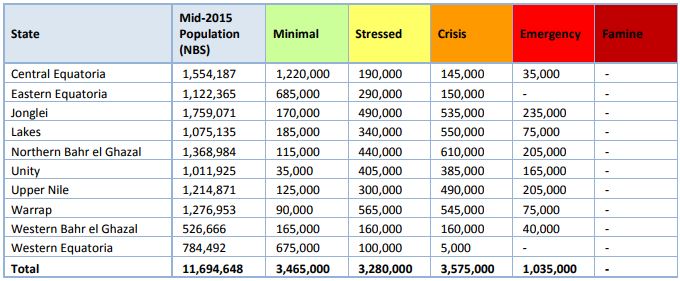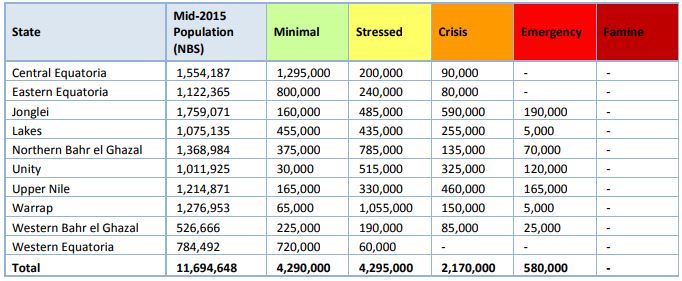01.12.2015
30.04.2015 > 30.09.2015
Map
Projected Map
Other Projections



Key
results
Population
estimates
Recommendations
& next steps
Acute
Malnutrition
The recent IPC analysis, conducted at the end of April 2015 in Nimule, indicates a further deterioration in the number of people facing severe food insecurity from 2.5 million people in January - March 2015 to around 4.6 million people during the lean period of May - July 2015.
An estimated 3.8 million people are classified as severely food insecure in April (3 million in Crisis and 800,000 in Emergency) and are unable to meet their food needs. The majority of these populations are located in the three conflict affected states of the Greater Upper Nile region and most parts of the Greater Bahr el Ghazal. As the lean season progresses, in May to July 2015, the situation will deteriorate even further to an estimated 4.6 million people classified severely food insecure (3.6 million in Crisis and 1 million in Emergency). However, the Greater Equatoria region remains generally food secure as households still have some stocks from own production.
Additionally, it is estimated that a further 4 million people will be in Stress (Phase 2) by end of April and cannot adequately sustain their livelihoods without engaging in negative coping. At the peak of this lean season (July), these populations will have depleted their stocks and the further loss of assets in efforts to access food will increase their vulnerability to Crisis level. A projected estimate of 3.2 million people will still remaining in Stress by the end of the lean season, requiring assistance.
Compared to May in most previous years, the lean season started two months earlier due to diminished household food stocks, high food prices and long-term effects of the conflict.
This analysis does not capture the on-going insecurity developments in Unity and Upper Nile. The IPC Technical Working Group (TWG) will update the analysis in early July, or sooner if the situation allows, to incorporate the impacts of the recent conflict on food security of the communities, depending on information availability.
Country Related Information
Contacts
- 01.04.2025 > 31.07.2025
South Sudan: Acute Malnutrition Situation Projection Update for April - June 2025 - 01.04.2025 > 31.07.2025
South Sudan: Acute Food Insecurity Situation Projection Update for April - July 2025 - 01.07.2024 > 30.06.2025
South Sudan: Acute Malnutrition Situation for July - September 2024 and Projections for October 2024 - March 2025 and April- June 2025 - 01.07.2024 > 30.06.2025
South Sudan: Acute Food Insecurity Situation for September - November 2024 and Projections for December 2024 - March 2025 and for April - July 2025 - 01.07.2023 > 30.06.2024
South Sudan: Acute Malnutrition Situation for July - September 2023 and Projections for October 2023 - March 2024 and April- June 2024 - 01.09.2023 > 31.07.2024
South Sudan: Acute Food Insecurity Situation for September - November 2023 and Projections for December 2023 - March 2024 and for April - July 2024 - 01.07.2022 > 30.06.2023
South Sudan: Acute Malnutrition Situation July - October 2022 and Projections for November 2022 - February 2023 and March - June 2023 - 01.10.2022 > 31.07.2023
South Sudan: Acute Food Insecurity Situation October - November 2022 and Projections for December 2022 - March 2023 and April - July 2023 - 01.02.2022 > 31.07.2022
South Sudan: Acute Malnutrition Situation for February - March 2022 and Projections for April - July 2022 - 01.02.2022 > 31.07.2022
South Sudan: Acute Food Insecurity and Acute Malnutrition Situation for February - March 2022 and Projections for April - July 2022 - 01.10.2020 > 31.07.2021
South Sudan: Acute Food Insecurity Situation for October - November 2020 and Projections for December 2020 - March 2021 and April - July 2021 - 01.01.2020 > 31.07.2020
South Sudan: Acute Food Insecurity Situation January 2020 and Projections for February - April 2020 and May - July 2020 - 01.01.2020 > 31.08.2020
South Sudan: Acute Malnutrition Situation January - April 2020 and Projection for May - August 2020 - 01.08.2019 > 30.04.2020
South Sudan: Acute Food Insecurity Situation for August 2019 and Projection for September - December 2019 and January - April 2020 - 01.08.2019 > 31.12.2019
South Sudan: Acute Malnutrition Situation for August 2019 and Projection for September - December 2019 - 01.05.2019 > 31.07.2019
South Sudan: Acute Food Insecurity Projection Update for May - July 2019 - 01.01.2019 > 31.07.2019
South Sudan: Acute Food Insecurity Situation January 2019 and Projections for February - April 2019 and May - July 2019 - 01.01.2019 > 31.08.2019
South Sudan: Acute Malnutrition Situation January - April 2019 and Projection for May - July 2019 - 01.09.2018 > 31.12.2018
South Sudan: Acute Malnutrition Situation September 2018 and Projection for October - December 2018 - 01.09.2018 > 31.03.2019
South Sudan: Acute Food Insecurity Situation in September 2018 and Projections for October-December 2018 and January-March 2019 - 01.01.2018 > 31.07.2018
South Sudan: Acute Malnutrition Situation in January 2018 and Projections for February-April 2018 and May-July 2018 - 01.01.2018 > 31.07.2018
South Sudan: Acute Food Insecurity Situation in January 2018 and Projections for February-April 2018 and May-July 2018 - 01.09.2017 > 31.12.2017
South Sudan: Acute Malnutrition Situation September 2017 and Projection for October - December 2017 - 01.09.2017 > 31.03.2018
South Sudan: Acute Food Insecurity Situation September 2017 and Projection for October - December 2017 and January - March 2018 - 01.05.2017 > 31.07.2017
South Sudan: Acute Malnutrition Situation for May 2017 and Projection for June - July 2017 - 01.05.2017 > 31.07.2017
South Sudan: Acute Food Insecurity Situation for May 2017 and Projection for June - July 2017 - 01.01.2017 > 31.07.2017
South Sudan: Acute Food Insecurity Situation for January 2017 and Projections for February - April 2017 and May - July 2017 - 01.09.2016 > 31.07.2017
South Sudan: Acute Malnutrition Situation for September 2016 - January 2017 and Projections for February - April 2017 and May - July 2017 - 01.08.2016 > 31.12.2016
South Sudan: Acute Malnutrition Situation August 2016 and Projection for September - December 2016 - 01.08.2016 > 31.12.2016
South Sudan: Acute Food Insecurity Situation August - September 2016 and Projection for October - December 2016 - 01.04.2016 > 31.07.2016
South Sudan: Acute Food Insecurity Situation in April 2016 and Projection for May-July 2016 - 01.01.2016 > 31.07.2016
South Sudan: Acute Malnutrition Situation January - April 2016 and Projection for May-July 2016 - 01.09.2015 > 31.12.2015
South Sudan: Acute Food Insecurity Situation August-September 2015 and Projections for October - December 2015 and January-March 2016 - 01.01.2015 > 31.03.2015
South Sudan: Update of Acute Food Security Situation Projection for January - March 2015 - 01.09.2014 > 31.03.2015
South Sudan: Acute Food Insecurity Situation September 2014 and Projections for October - December 2014 and January - March 2015 - 01.05.2014 > 30.08.2014
South Sudan: Acute Food Insecurity Situation in May 2014 and Projection for June - August 2014 - 01.01.2014 > 31.01.2014
South Sudan: Acute Food Insecurity Situation in January 2014 - 30.07.2013 > 30.10.2013
South Sudan: Acute Food Insecurity Situation July - August 2013 and Projection for July - October 2013 - 18.11.2012 > 18.03.2013
South Sudan: Acute Food Insecurity Situation in November 2012 and Projection for November 2012 - March 2013 - 25.08.2012 > 30.11.2012
South Sudan: Acute Food Insecurity Situation August 2012 and Projection for August - November 2012 - 01.04.2012 > 20.07.2012
South Sudan: Acute Food Insecurity Situation April 2012 and Projection for April-July 2012 - 09.12.2011 > 31.03.2012
South Sudan: Acute Food Insecurity Situation December 2011 and Projection for December 2011 - March 2012
- 22.04.2025 > 06.05.2025
South Sudan: Acute Food Insecurity and Acute Malnutrition Analyses (Update) - 25.09.2024 > 05.10.2024
South Sudan: Acute Food Insecurity and Acute Malnutrition Analyses - 18.09.2023 > 28.09.2023
South Sudan: Acute Food Insecurity and Acute Malnutrition Analyses - 03.10.2022 > 15.10.2022
South Sudan: Acute Food Insecurity and Malnutrition Analyses
Join our mailing list



